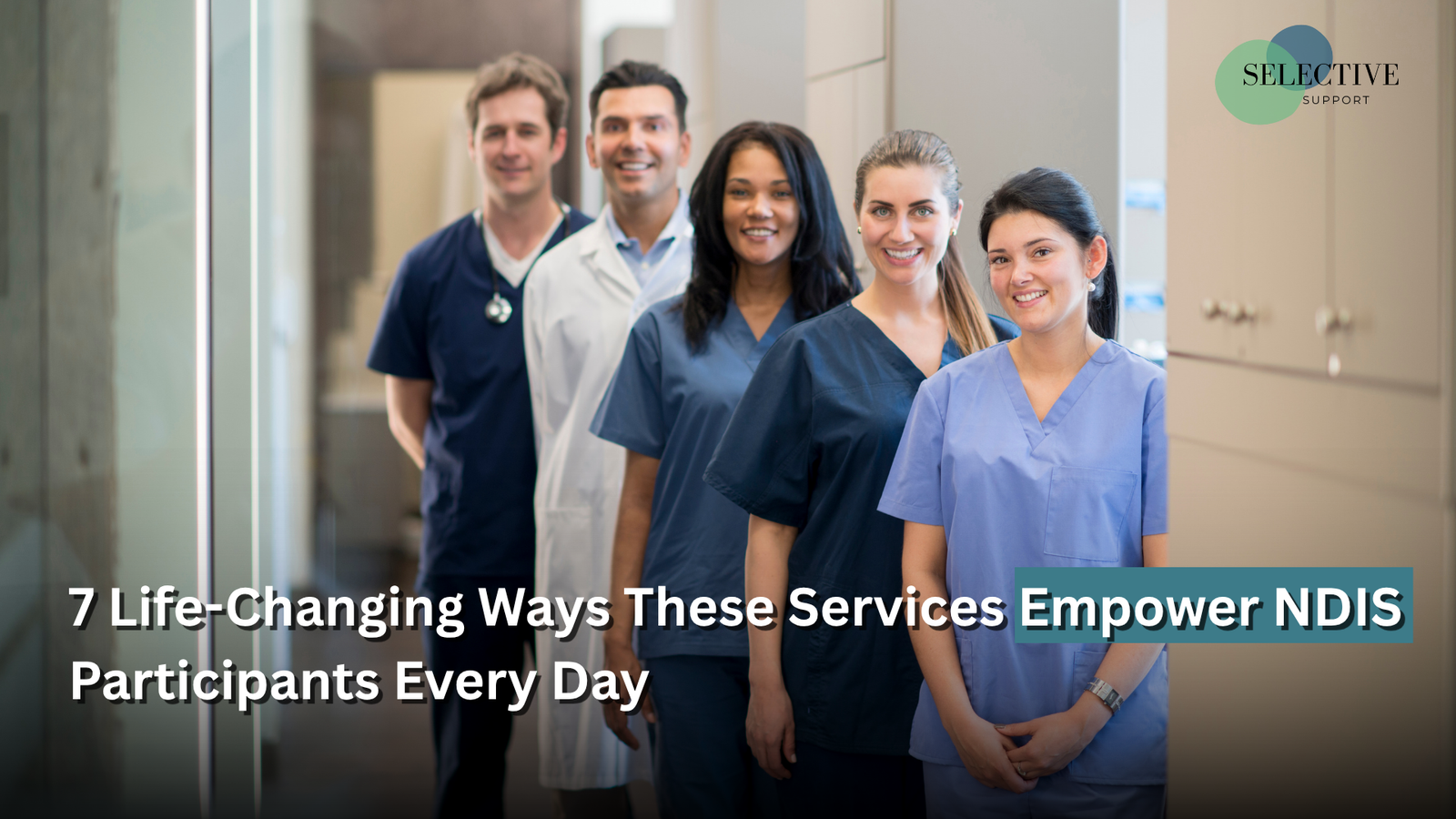Allied Health Services: 7 Benefits You Might Not Know About as an NDIS Participant
Have you ever wondered if there’s more support out there that could actually make day-to-day life feel easier? Many NDIS participants and carers don’t realise just how much allied health services can do, beyond physio appointments or therapy sessions. From helping you build a routine that works to improving your mental wellbeing, these services are designed to support the whole person, not just a diagnosis.
In this blog, we’ll walk you through 7 powerful benefits of allied health and therapy services you might not have heard about and how they can help you feel more confident, connected, and in control.
Understanding Allied Health and Therapy Services in the NDIS
If you’ve ever looked at your NDIS plan and felt unsure about what supports actually help with day-to-day life, you’re not alone. Many people hear the term allied health services but don’t fully understand what it includes or how it can fit into their goals.
Put simply, allied health and therapy services are designed to support your physical, mental, and emotional wellbeing. They include a range of professionals who aren’t doctors or nurses but play a big part in your health journey, such as:
- Occupational Therapists (OTs)
- Physiotherapists
- Speech Pathologists
- Psychologists and Mental Health Therapists
- Dietitians
In the NDIS, these services are often included to help you build skills, stay healthy, and feel more in control of your life. Whether it’s learning to cook safely, improving how you communicate, or finding ways to manage anxiety, allied health care services focus on what matters to you.
You don’t need to figure all this out by yourself and you don’t need to be an expert in your NDIS plan to get the right help.
7 Surprising Benefits of NDIS Allied Health Support
You might already know that allied health services are part of many NDIS plans, but what you may not realise is just how broad and life-changing that support can be. From daily routines to emotional wellbeing, these services are designed to meet you where you are and help you move forward in ways that feel right for you.
1. NDIS Allied Health Services Help You Manage Everyday Life
If tasks like cooking, getting dressed, or keeping your space organised feel challenging, you’re not alone. Occupational Therapists (OTs) can support you with practical strategies and tools to make everyday life safer, easier, and more predictable. It’s not about doing everything perfectly, it’s about building a routine that works for you, without added stress.
2. Allied Health and Therapy Services Improve Mental Wellbeing
Your mental health matters just as much as your physical health. Under the NDIS, allied health and therapy services can include psychology, coaching, or brief counselling sessions that help you build resilience, reduce anxiety, and feel more emotionally balanced. It’s okay to ask for help and you don’t have to wait until things get worse to do so.
3. You’ll Build Confidence Through Small, Meaningful Wins
Allied health professionals focus on goals that feel achievable, whether it’s attending an appointment, joining a social group, or getting through the week with less anxiety. These small wins build momentum and confidence over time, especially for participants who feel stuck or unsure where to start.
4. Allied Health Care Services Can Come to You
Not everyone can travel easily or wants to sit in a waiting room. Many allied health care services can happen right in your home or nearby. At Selective Support, we help coordinate these services to save you time and keep everything simple, no chasing multiple providers or repeating your story.
Looking for support that fits around your life? We’ll help connect you to allied health care services that work for you not the other way around.
5. They Help You Communicate and Connect Better
Struggling to find the right words or express your needs can feel frustrating and isolating. Speech pathologists, part of many allied health teams, can help you or your loved one build communication skills that boost confidence, improve relationships, and make daily life feel more connected.
6. Allied Health Services Focus on Prevention Too
Allied health isn’t just about treatment, it’s also about staying well. With early support, you can prevent issues like falls, injuries, emotional burnout, or poor nutrition before they become bigger problems. It’s a proactive way to protect your wellbeing long-term.
7. Allied Health and Therapy Services Work as a Team
What makes a real difference is when your support team works together. At Selective Support, we help bring your allied health and therapy services into one coordinated plan, so you don’t have to explain yourself over and over. That means better care, clearer communication, and a smoother path forward.

How to Access NDIS Allied Health Through Your Plan
If you’re looking at your NDIS plan and thinking, “Where do I even begin with allied health?” you’re not alone. Knowing what you can use and how to access it can feel overwhelming at first, but it doesn’t have to be.
Start by checking which categories your funding is in. Most NDIS allied health services are covered under Capacity Building – Improved Daily Living. This can include things like OT assessments, physio, counselling, speech therapy, or psychological support.
From there, a Support Coordinator (like the ones at Selective Support) can help you:
- Understand what’s included in your plan
- Prioritise which services match your needs and goals
- Connect you with trusted local providers
- Book appointments and make sure your supports work together
We also help explain everything in plain language, no jargon, no rushing. Whether you’re starting fresh or adjusting an existing plan, we’ll help you use your allied health and therapy services in a way that actually supports your life, not just ticks a box.
If your plan includes allied health and you’re not sure how to use it, we can help. Let’s explore it together.
The Right Support Can Change Everything
You don’t have to have all the answers, and you’re not expected to navigate the NDIS on your own. Allied health services aren’t just about therapy or appointments; they’re about building confidence, improving your daily routine, and feeling supported in ways that truly matter. Whether you’re a participant or a carer, the right team can help turn overwhelm into clarity, one step at a time.
If you’ve been unsure how to get started or what support is available to you, we’re here to guide you, patiently, personally, and with care.
Ready to see what’s possible with the right allied health support? Get in touch with our team today, we’re here to listen and help.
Frequently Asked Questions About Allied Health Services
1. What is the role of the allied health profession?
The role of the allied health profession is to support your overall wellbeing in practical, everyday ways. While doctors diagnose and treat illness, allied health professionals work with you on the skills, strategies, and supports that help you live well at home, in the community, and in your relationships.
2. Are allied health services covered by Medicare?
In some cases, yes, if you have a Chronic Disease Management Plan (CDMP) from your GP, you may be eligible for up to five subsidised allied health sessions per year. However, for NDIS participants, most allied health services are funded through your NDIS plan, especially under Capacity Building – Improved Daily Living.
3. Who are allied health services for?
Allied health services are for anyone who wants support with their daily function, mental health, communication, or physical wellbeing. For NDIS participants, these services are tailored to help you reach your personal goals and live more independently, at your own pace, in your own way.


